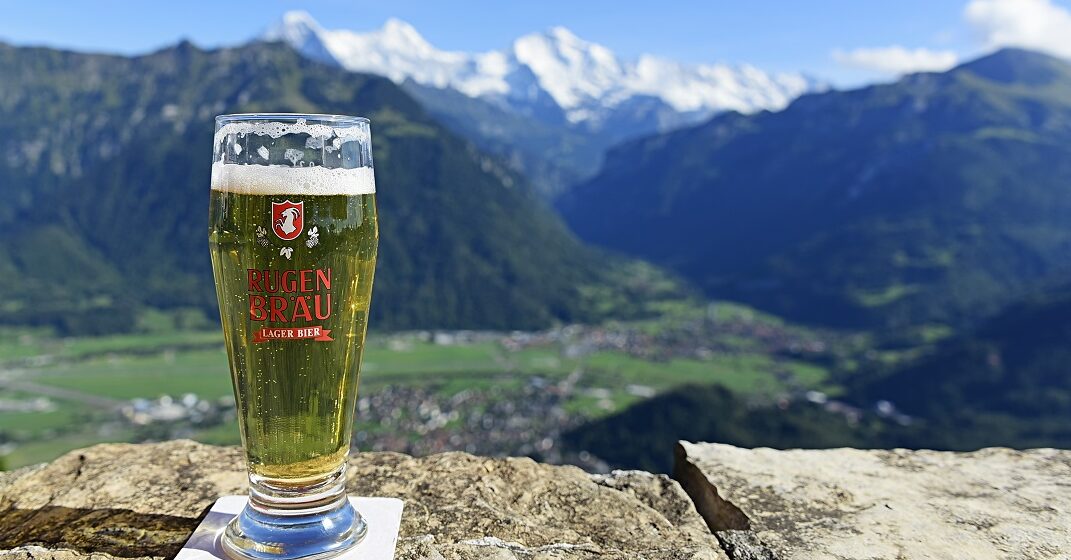Swiss beer: A tasting guide

Switzerland, famous for its breathtaking Alpine landscapes and exquisite chocolates, is also home to a vibrant beer culture. While not as internationally renowned as brews from neighboring Germany, Swiss beers have a rich history and a diverse range of flavors to offer. Beer enthusiasts visiting Switzerland can look forward to sampling traditional lagers, excellent pale ales and even a range of alcohol-free beers.
Learn languages at your pace
The history of Swiss beer
Beer brewing in Switzerland dates back centuries, with records showing brewing activities as early as 754 CE in St. Gallen. Over time, brewing became more widespread, and breweries began to emerge across the country.
By the end of the 19th century, there were over 500 breweries in Switzerland, reflecting the population’s love of beer. In 1877, the breweries formed the Swiss Brewery Club, which was intended to keep foreign imports out of the market. In 1935, they established a cartel, which meant that the beer market in Switzerland was dominated by domestic products.
At the end of the 1980s, only 1% of beers in Switzerland were imported, but this changed rapidly in the 1990s. The cartel’s stranglehold on beer production meant that there had been little innovation in beer brewing in Switzerland for a long time. The Swiss were thirsty for something better. This explains why an increasing number of microbreweries have popped up across the country in the last few decades. These days, there’s plenty of hoppy goodness to try.
The different types of Swiss beer
Lager is Switzerland’s beer of choice; almost 70% of beers consumed in Switzerland in 2022 were lagers. Other popular types of beer include IPA, Weissbier and non-alcoholic beer.
Lager
If you only drink one beer in Switzerland, make it Feldschlösschen. The most popular beer in Switzerland, Feldschlösschen Original is a light lager that’s unlikely to offend with its crisp, clean taste. The other big hitter in the lager market is Calanda Bräu, which is based in Chur and has been brewing since 1902.
Pale ale
For the hop lovers out there, Swiss pale ales offer a delightful balance of bitter and refreshing. Check out the black, white and classic IPAs from the highly rated brewery Hoppy People, or the delightfully named BUUH! and Citra J. Parker from another favorite Swiss microbrewery, Tingel Tangel Beer.
Learn languages at your pace
Weissbier
Weissbier, or wheat beer, is another prominent style in Switzerland. It is brewed using a substantial proportion of wheat, giving it a distinctive fruity and spicy flavor profile. Check out the offerings from one of the country’s top-rated microbreweries, Brasserie des Franches-Montagnes, including their all-time favorite La Salamandre and the lighter Madam' Masson, which is blended with fruit juice.
Other craft beers
In recent years, the craft beer movement has gained momentum in Switzerland, leading to the emergence of numerous microbreweries across the country. These breweries experiment with styles such as IPAs, stouts and sour beers, showcasing the diversity of Swiss beer culture.
One notable craft brewery is Brasserie du Chauve, where you can find pale ales, stouts and seasonal specials. Another is La Nébuleuse, which serves up hoppy IPAs and pale ales. Don’t miss the citrusy, tropical notes of the brewery’s Diversion IPA.
Non-alcoholic beer
There are lots of ways to slake your thirst for a cold one without the boozy buzz in Switzerland. Major sellers like Feldschlösschen and Calanda offer a range of alcohol-free beers, but you might also enjoy Chopfab’s alcohol-free IPA.
Raise your glass at a beer festival
Switzerland knows how to throw a beer bash! Don't miss annual events like the lively Lausanne Beer Celebration or the Zurich Beer Festival, where you can immerse yourself in the vibrant Swiss beer culture. These festivals are not only about the beer itself — they’re also a chance to mingle with local brewers and discover new Swiss towns and cities.
Enjoy the taste of Swiss beer
The next time you find yourself in the picturesque Swiss Alps or wandering the charming streets of Geneva, take the time to explore the flavors of Swiss beer. From the classic lagers of the big breweries to the IPAs of modern craft brewers to fruity Weissbier, Switzerland is a beer lover's paradise. Proscht (cheers) to your next Swiss beer adventure!













